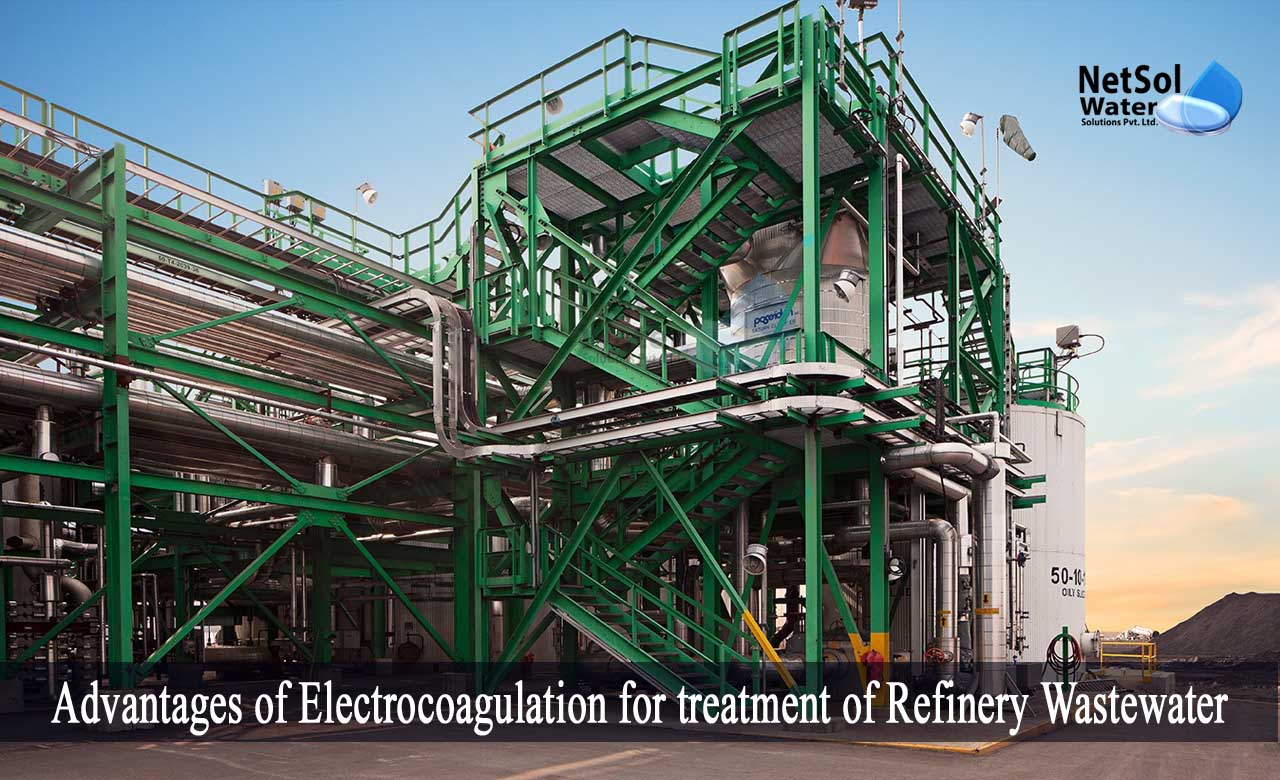Introduction
The complicated, high-temperature processes of crude oil creation need a lot of water. According to estimates, 1.5 barrels of raw water are needed to process one barrel of crude oil, and 70–90% of that water is wasted. Most of the water is utilized for cooling towers, the preliminary desalting procedure, and is also turned to steam for many of the remaining refinery production operations.
Because, of all the chemical procedures employed in refining, the wastewater includes contaminants like Free oil, Emulsified oil, TSS, BOD, COD, Sulfides, Phenols, Cyanides, Ammonia, Hydrocarbons, etc. As a result, treatment of refinery wastewater using technologies, such as electrocoagulation is necessary, and provides many benefits.
How is crude oil created?
The fossil fuel known as crude oil is created, when long- term dead organisms are exposed to extreme heat and pressure underground. This resource serves as the primary component in the manufacture of asphalt, kerosene, diesel fuel, lubricants, and other products. The production of all of these products in a single refinery is possible, because to a sophisticated network of chemical procedures.
Atmospheric distillation, which separates the crude oil into various components, is the main refinement step. Through the creation of the various oil products, each of these fractions is transported to a different process. As a result, treating the effluent from these processes in refineries can be rather difficult.
Effect of refinery wastewater on humans and aquatic life
For both people and animals, hydrocarbons, phenols, and cyanides are extremely poisonous. Aquatic plants and animals may suffer from oil contamination in surface waters.
With the exception of TSS and BOD, which should have concentrations of less than 20 mg/L and COD, less than 200 mg/L, most of these pollutants must be present in less than 10 mg/L for refinery discharge.
For wastewater clean-up, many refineries already have wastewater treatment systems. They employ techniques like equalization, aeration, dissolved air flotation, biological processes, chlorination, ultrafiltration, and reverse osmosis.
Advanced wastewater treatment technology for refinery wastewater
Because, so many treatment techniques must be performed, in order to render the wastewater suitable for reuse or disposal, these comprehensive processes can be complicated and time-consuming.
Advantages of Electrocoagulation for Refinery Wastewater treatment
1: By incorporating electrocoagulation, it may be able to simplify the clean-up of oil and petrochemical refinery wastewater.
2: Through electrolysis, the EC method may remove a wide range of sediments, chemicals, heavy metals, FOG, and pathogens.
3: Through electrochemistry, this process involves oxidation and reduction at the anode and cathode, respectively. Each of these processes results in the coagulation of lighter and heavier solid particles, creating floc, which is then separated in a post clarifying process.
4: The quantities of free oils and hydrocarbons as well as suspended particles, could be greatly reduced prior to the EC process, by implementing an EC unit downstream of oil separation and solids filtering units. As a result, it is possible to adjust the EC process to lessen emulsified oils as well as phenols, sulphides, COD, and BOD.
5: It doesn't take much more treatment to bring pollution levels down to the point, where they can be safely reused or discharged.
6: One of the main advantages of employing EC, as a component of a solution to remediate refinery wastewater, is the streamlining of the treatment process.
7: Faster treatment times and cheaper capital and operating costs are further benefits of a shorter process chain. Additionally, shorter process chains need less room to operate. Particularly, EC is an economical and space-saving treatment option.
8: Since the process can achieve good removal rates at an ideal current density, and in a short amount of time, the energy consumption for EC is also fairly low (i.e. 30-60 minutes).
9: Chemical treatment procedures frequently produce sludge, whereas EC rarely needs chemical additives, therefore, the amount of sludge produced is kept to a minimal, saving money on disposal costs.
Conclusion
With regard to specialized electrochemical process train integrations in petrochemical refinery applications, Netsol Water offers specialist knowledge and experience.
Netsol Water is Greater Noida-based leading water & wastewater treatment plant manufacturer. We are industry's most demanding company based on client review and work quality. We are known as best commercial RO plant manufacturers, industrial RO plant manufacturer, sewage treatment plant manufacturer, Water Softener Plant Manufacturers and effluent treatment plant manufacturers. Apart from this 24x7 customer support is our USP. Call on +91-9650608473, or write us at enquiry@netsolwater.com for any support, inquiry or product-purchase related query.



